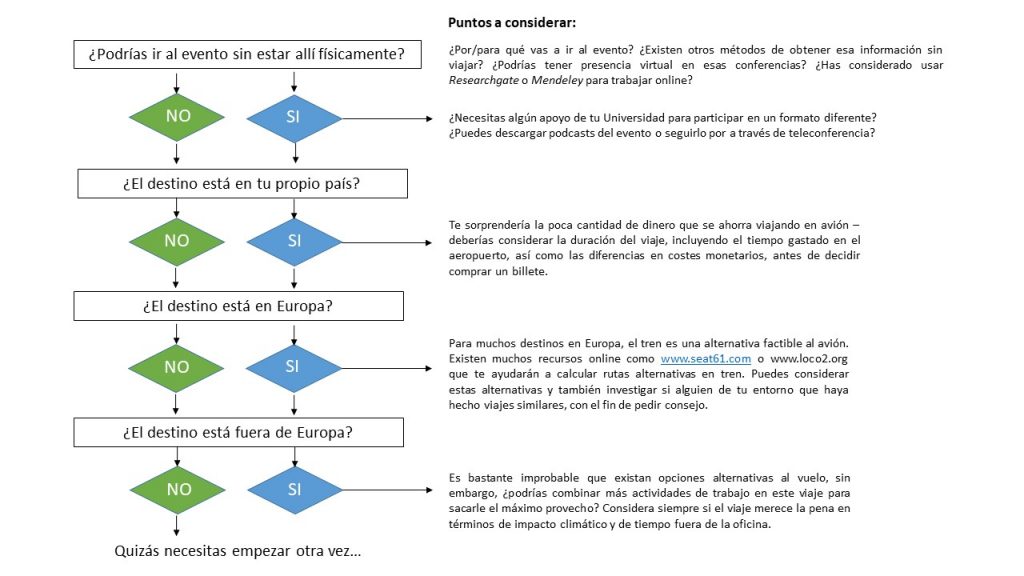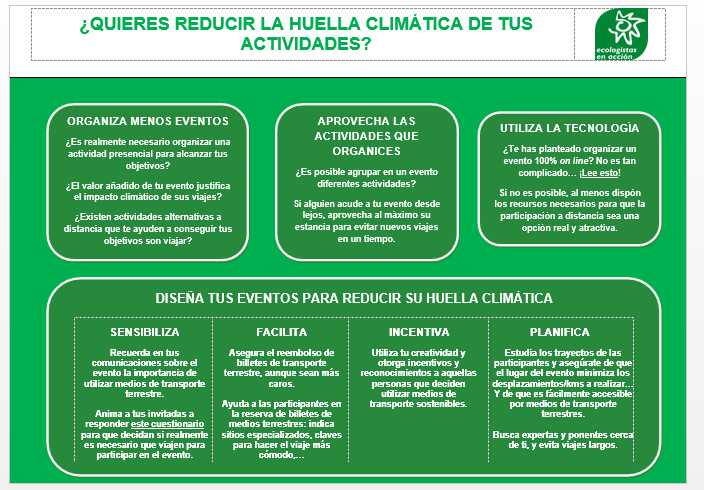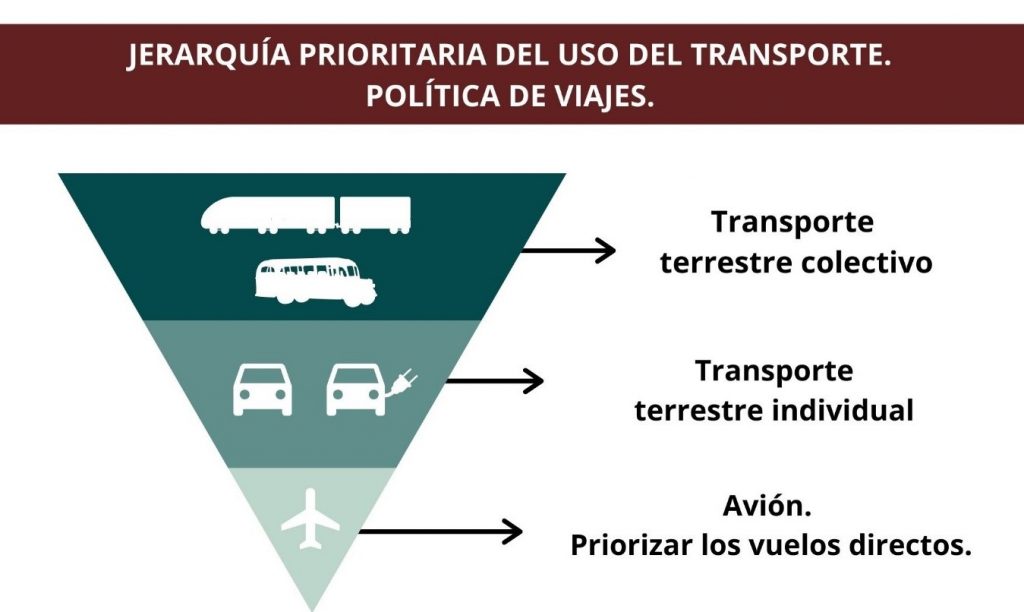Area of application
This Travel Policy shall be applied to all trips taken by The Group of Energy, Economy and System Dynamics (GEEDS) members, and represents a recommendation for anyone invited by GEEDS to Valladolid (Spain). With this document, GEEDS joins the European campaign Let’s Stay Grounded.
Principles inspiring this policy
Transportation is one of the main sources of greenhouse gas emissions globally. In the European Union, transport generates more than one quarter of total greenhouse gas emissions (GHG). In the case of Spain, in 2019 the emissions associated with mobility represented 29% of the total, being the sector that generated the most GHG.
In this context, the impacts caused by air transport are especially damaging. Beyond the contribution of airplanes to global warming, which some studies place between 5 and 8%, air transport causes serious environmental problems (deforestation, destruction of ecosystems), social problems (health problems, displacement of communities, etc.) and economic problems (tax privileges, hidden subsidies, etc.).
GEEDS as, a research group, recognizes the importance of the problems previously described and assumes its responsibility to minimize the impact of national and international displacements derived from its activity as much as possible. To do so, GEEDS defends a mobility model in which, on the one hand, the number of trips is reduced and, on the other, the cleanest and most sustainable means of transport are prioritized.
By adopting this Travel Policy, GEEDS intends to be a proactive and transparent research group in its objective of reducing emissions associated with the mobility of its members. Furthermore, by applying the guidelines set out in this document the group wants to contribute to the construction of a fairer and more sustainable transport system from a social, environmental and economic point of view.
Our commitments
With the approval of this Policy, The Group of Energy, Economy and System Dynamics undertakes to:
- Implement a long-term strategy aimed at a significant and sustainable reduction of emissions related to travel and mobility of its members
- Propose to the University of Valladolid (UVa), and to the General Foundation of the University of Valladolid (FUNGE), the implementation of tools, procedures and resources necessary to facilitate the use of sustainable means of transport when traveling, as well as to systematically record and monitor the emissions generated by such trips. And, as a consequence, GEEDS will collaborate as much as possible with the UVa and FUNGE for the adoption and use of these instruments.
- Use the emission registers and the analysis of their evolution as tools for raising awareness in the university community about the social and environmental impact of traveling, as well as a motivational instrument to progressively reduce said impact.
- Play a proactive role in sensitizing other actors —social, economic, institutional, etc.— about the socio-environmental impacts of the most polluting means of transport, and especially aviation.
Key areas of action for the implementation of the policy
The implementation of the aforementioned commitments will be articulated around the following areas of action.
A. Planning and monitoring the reduction of emissions associated with travel.
- After the approval of this Travel Policy, GEEDS will carry out an inventory of the trips taken during 2019 and the emissions associated with them. This inventory will serve as a baseline for setting the corresponding emission reduction targets.
- After an analysis of the available calculators, due to their reliability and usability, Ecopassenger is established as the reference calculator to determine the emissions generated in each trip. One of the reasons why Ecopassenger is the calculator of choice is that, unlike others, it calculates CO2 emissions from a ‘well to wheel’ perspective, which means that it is takes into account all accumulated energy consumption and not only that derived from the commissioning of the means of transport in question. Furthermore, in the case of train travel, the methodology is based on the Enviromental Strategy Reporting System.
- GEEDS will create a tool for the collection of data on emissions related to trips made by its members. Said tool, while respecting confidentiality criteria regarding the data of the people who had taken the trips, will be publicly accessible, with the aim of informing and raising awareness about the emissions generated by the research group’s trips.
- On an annual basis, an evaluation of the emissions of the previous year will be carried out and the corresponding objectives will be set for the subsequent year/s.
- For the sake of transparency, the GEEDS will make public both the Travel Policy and the inventory of trips and emissions for the year 2020, as well as the emissions generated in subsequent years.
B. Incorporation of routines to reduce emissions of GEEDS’s trips.
- Actions and events (meetings, workshops, seminars, etc.) that can be carried out without the need for physical attendance will be prioritized. In those situations in which traveling is unavoidable, the means of transport will be chosen following the hierarchy shown in Appendix 3.
- Land transportation will be used for all trips within the peninsular territories of Spain.
- For international trips with a duration of up to 10 hours, land and collective passenger transportation will be prioritized.
- For all international trips within the European Union, land and collective alternatives will always be considered, comparing at least the following parameters of the air (if necessary) and land alternatives: price, emissions, duration and safety of the trip. [1]
- Assessment, in the face of any activity that involves traveling by plane, the real need to participate in it – if the objectives pursued can be achieved without making the journey, if participation is possible through telematic means and if the benefit for the person and GEEDS justify the use of air transport (see Appendix 1. Decision tree for air travel).
- In the case of having to use air transport, the least unsustainable way of flying will be chosen taking into consideration the following guidelines:
- Prioritize direct flights, when there are available routes, even if their price is higher.
C. Financing
The commitments acquired in this policy necessarily entail an economic endowment to meet the expenses derived from its implementation.
The institutional infrastructure should allow the booking of alternative travel modes and the individual employee should not have to cover personally any additional costs.
GEEDS assumes the commitment to prepare budgets that respond to the principles of the Travel Policy set out in this document, incorporating, if necessary, this greater reserve / forecast of expenditure derived from the use of collective land transport to the detriment of the use of the plane.
This expense forecast will also address the cases in which it is essential to choose air travel, allowing to assume a higher cost of choosing a direct flight.
D. Building an organizational culture that promotes sustainable travel.
- When GEEDS organizes activities, it will prioritize initiatives that minimize travel needs. Those actions that necessarily require the movement of attendees (speakers) will incorporate into their organization the necessary criteria to minimize the emissions associated with the trips of said people (See Appendix 2. Criteria to minimize emissions from trips in activities).
- To promote the use of sustainable means of transport, the principles and commitments contained in this policy will be integrated into the operating procedures of the organization related to it: human resources (accounting and compensation of hours worked on trips, coverage of expenses, etc.), project management (budgeting, participation in/organization of activities), etc.
- Remote work will be promoted as a tool to reduce members’ number of trips. To do this, GEEDS members will be accompanied and trained in online communication and work tools, and investments will be made as far as possible in technologies that facilitate this type of work.
- GEEDS will make information and support available to its members to facilitate ticket reservations through the use of specialized land travel portals and agencies, such as Trainline or Seat 61.
- GEEDS will request the travel agency of the University of Valladolid (currently B The Travel Band) to incorporate measures to reduce the environmental impact in the travel search and selection processes based on the information available for each of the means of transport and corresponding routes. GEEDS will collaborate with the travel agency to facilitate that these measures can be carried out in practice.
- Using as a reference the document issued by the Institut de Ciència i Tecnologia Ambientals (ICTA) to the UAB, based on the experience acquired, a proposal will be made to the UVa to implement a travel policy in clean means of transport.
- The Travel Policy will be promoted among the networks in which the GEEDS participates, especially in debates on the importance of advancing in organizational mobility policies that include the incorporation of facilities to attend meetings in more sustainable means than the plane, preferably by train.
[1] For the moment, sea transport is not mentioned as an option because it is considered a minority and there is not enough information available to take it into account. However, further information is appreciated and will be considered in the future.
[2] By default, the data included in the 2018 Atmosfair Index will be taken as a reference. See link: https://www.atmosfair.de/en/air_travel_and_climate/atmosfair_airline_index/
[3] Creative ticketing is a practice of obtaining cheaper fares by purchasing – following different forms – more air routes than initially necessary, only to use a part of them. The underlying logic is that direct flights with fewer nights are more expensive; therefore by purchasing additional routes and nights , the price is considerably cheaper, even though it generates flights with hardly any passengers.
Appendixes
Appendix 1. Decision tree for individual trips

Appendix 2. Infographic criteria to take into account to minimize travel emissions when organizing an activity.

Appendix 3. Hierarchy infographic in the use of transportation for travel.



